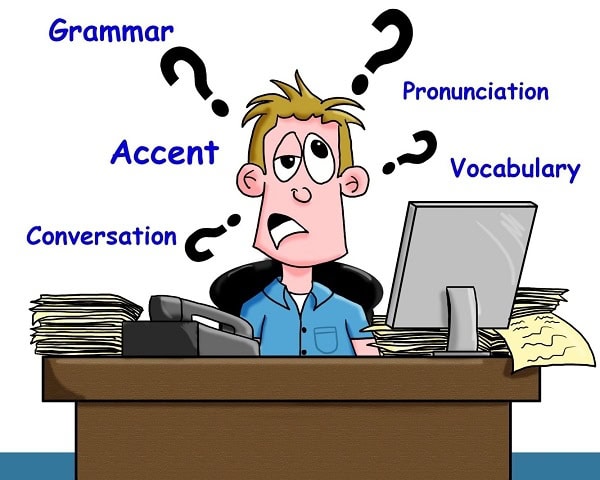Perhaps any of us who have studied English or are practicing TOEIC find this subject really difficult to swallow. But have you ever wondered why learning English is so difficult? First, let's learn some information about English!
English is a West Germanic language and is known as a lingua franca. It was originally spoken in medieval England and is the third most spoken language in the world after Chinese and Spanish. It is the official language in nearly sixty sovereign countries. Many people are learning English as a second language. Learning English will help you in many different ways.
English is an international language of communication and it is widely spoken and among the most common business languages used globally. Moreover, it is rightly called the language of the internet. Did you know that more than 50% of the most visited websites globally are in English? So learning to speak and write English can open up many academic and business opportunities for you.

Now do you know what it means to learn English? Do you want to get started? Please note that it really won't be easy. Foreigners often find it difficult to learn for a number of different reasons. If you are planning to learn it, keep in mind that it will be very time consuming. However, you will learn perseverance and practice. Learning a foreign language is not only a talent, but also a process of effort
Why is English So Hard to Learn?
There are nearly 6000 languages spoken globally. Some languages are more subtly related than others. The clear perspective of linguists shows that languages are like families. They are derived from each other and form the family tree. Migration also influenced the development of languages over time. Besides, new concepts and antiquity are constantly being added. This means that languages are constantly being discovered but we need to find them in the family tree.
For example, English is from a group of Germanic languages so Germans and Dutch people will find it easier to learn English than Japanese speakers (not related to German languages). Many people are learning English to get a better position in society, to secure jobs and to communicate effectively with people around the globe. Take a look at five of the biggest dilemmas in learning English.
5 Reasons Why English Is Difficult For Vietnamese People
Complicated and confusing grammatical structures
English grammar is very complicated which leads English to be very difficult to learn and use logically. That becomes more difficult if you talk to an English speaker at a fast pace. Learning grammar is similar to learning to drive a car. You will not be able to learn the English language well unless you practice it.
Grammar plays an important role in learning English. Using the wrong grammar will change the meaning of your communication. Despite the existence of unique grammar patterns in English, it makes learning difficult. However, with perseverance and hard practice, you can learn. Native English speakers are very sensitive to the use of grammar and pay attention immediately if there are any mistakes.
Simply put, complex grammar rules pose a great challenge to English learners. If and when you master the grammar, learning this language will become easy.
However, do not focus too much on grammar. It will backfire and affect communication quite a lot, such as when starting a conversation or wanting to say an English sentence, you have to spend a lot of time thinking. The reason is because you attach too much importance to grammar rules

Just read the definitions of words and forget to put them in the right context
Facts about the English Language, 26% of English is derived from German, 30% from French and 30% from Latin. This suggests that French and Latin speakers may not have any difficulty in learning English as they are familiar with a lot of vocabulary. The same is true of Dutch and German speakers. English has the largest vocabulary compared to other languages.
It can be confusing for speakers when English is not a native language. If vocabulary is not used properly, people whose first language is English will be easy to see. Inappropriate use of vocabulary will not change the meaning of the text but lose its meaning.
This is a common mistake, when you simply understand what they mean, but don't know how to use them. For example, between the two words "Come" and "Go", if you just look up the dictionary, you will realize that the meanings of those two words are quite similar, both mean "go". However, they have completely different uses. We use "Come" when we want to express a move to where the speaker or listener is: When I came to Paris 2 years ago, I did not understand French – Five years ago when I came to Paris, I did not understand French.
And “Go” is when you want to express moving away from where the speaker or listener is: When I went to Paris 5 years ago, I spoke French very well. – Five years ago when I came to Paris, I spoke French very well.
>>> Recommended viewing: 12 English Words With Strange Origins
Slang and idioms are complicated and confusing and don't follow any rules
For any language family, slang and idioms are always the key to being able to really communicate well. It's hard to say that I really understand a language but only have a few idioms in my head. Of course, memorizing and using English idioms correctly and effectively is not easy
If you want to learn English using it with native speakers, you need to learn slang words and expressions. Formal expressions and grammar can separate you from native speakers and make it difficult to establish a communication connection. Another difficult thing in learning English is learning idioms.
Idioms are expressions of words whose meaning is not related to its literal meaning. People who are learning English find it difficult to accurately predict the meaning of words. All languages use idioms but in scope, finding English idioms is difficult for learners.
>>> Recommended viewing: 100 English Slang Words And Phrasesh

English pronunciation is not easy
Pronunciation is currently one of the weakest points faced by learners when learning English. Just because a person has a thorough understanding of grammar knowledge does not mean that they can pronounce English correctly.
Pronunciation in English is not easy. Learners are often taught how to pronounce 'k' and 'knight'. They are taught through lessons how to pronounce a word or how to convey the correct meaning of that word. Therefore, pay attention to the mother tongue of the British, it is really difficult to pronounce with absolute accuracy. For this, you should create phonetics before speaking.
Errors in English are extremely confusing and complex.
Deviation of different dialects in English is very confusing. For example, the difference between formal and informal language and spoken and written language. Because of this, many students begin to write words phonetically. This means that the way they speak is better than the spelling of them.
Many people think that dialects are modified versions of a language, spoken by people who do not understand English well and have many errors because they do not yet know the correct grammar but this is wrong. A standard language does not mean that it will be 'better' than other dialects linguistically, it is simply a dialect that has been chosen for official use such as in government and in government. education. All dialects of English have a long history, since it was a typical communication style of the Germanic and Scandinavian invaders, who came from many parts of Northern Europe with the aim of conquest. England in the Middle Ages. And each dialect has a grammatical pattern as diverse and systematic as Standard English, even if it may differ.
Dialects are not the same as dialects (although they often go together). Many Britons speak standard English, but with their distinctive local accent. However, others combine standard English and do not mix typical local pronunciation. This is the pronunciation commonly used by the majority of upper- and middle-class people in England (also known as the standard pronunciation, received pronunciation – RP), although this usage varies greatly by country. time. For a long time, RP was considered a more 'correct' pronunciation than other accents and its influence was further reinforced by education and media. This is slowly changing and there is less and less social prejudice in the UK against local accents.
>>> Recommended viewing: Secrets of Translating Idioms From Countries To Standard English

Learning a foreign language requires not only talent, but also a process of hard practice
To become a part of the global world, it is very important to learn English. Although, learning English is not easy and there are many challenges that you will have to face. However, with dedication and consistency, you can learn to speak and write it. Pay special attention to English grammar, vocabulary, slang, idioms, pronunciation, and deviations in the language and learning will be interesting to you.
In case if you cannot overcome the barrier of learning English than you need to contact the English Translation Service. Many translation companies help you translate all kinds of documents in English, but speaking, you need practice.
Sharing Translation Experience

Nguyen Trung Khang - Talented interpreter and translator, passionate about translation
Nguyen Trung Khang is a talented interpreter and translator, with many years of experience in the field of translation and linguistics. He graduated from Ho Chi Minh City University of Education, majoring in Linguistics in 2015.
After graduating, Mr. Khang participated in a professional interpretation and interpretation training course at the University of Foreign Languages - Hanoi National University. He achieved a high-level certificate in interpreting and interpreting, and was also awarded a master's degree in linguistics.